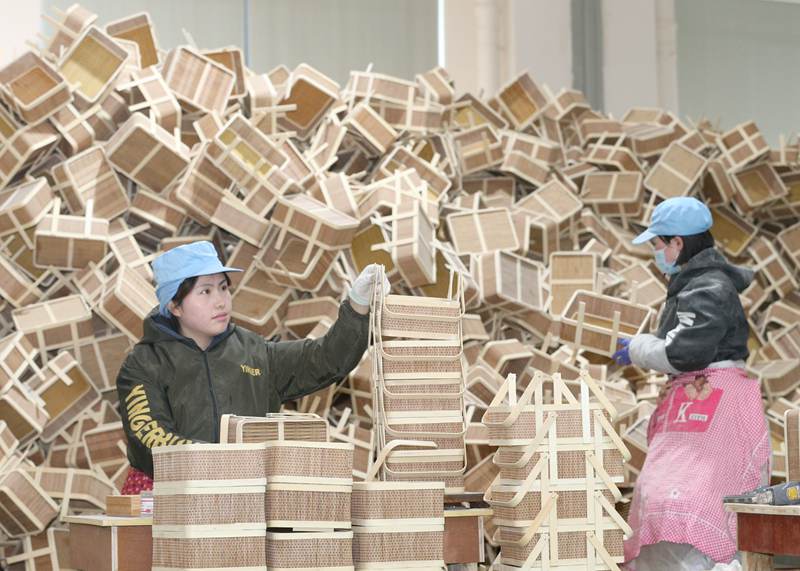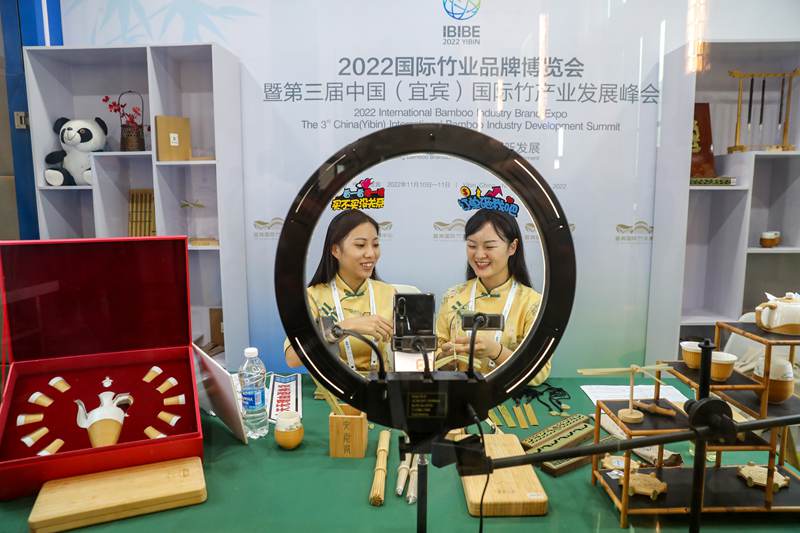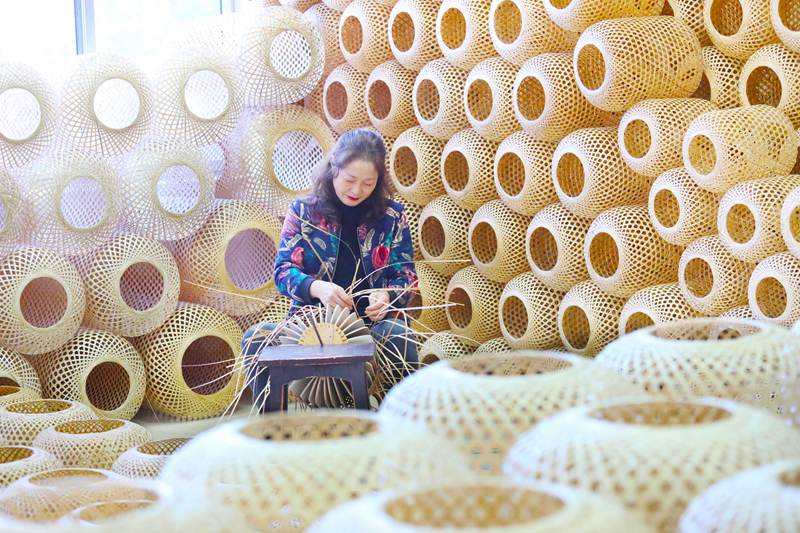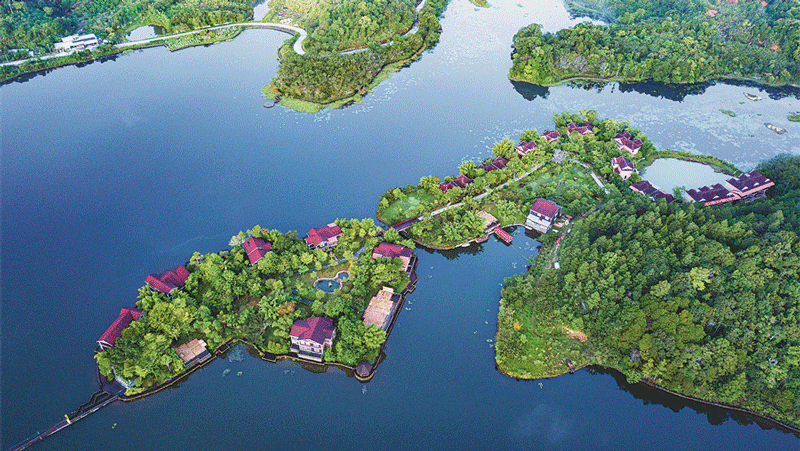China contributes to global sustainable development through bamboo for plastic initiative
Recently, China and the International Bamboo and Rattan Organization (INBAR) proposed the Bamboo as a Substitute for Plastic Initiative to tap the potential of bamboo as a nature-based solution for reducing plastic pollution.

Employees produce bamboo utensils at a company in Meixi township, Anji county, Huzhou city, east China’s Zhejiang Province, Feb. 10, 2022. (vip.peole.com.cn/Xia Pengfei)
The initiative will contribute to accelerating the implementation of the United Nations (UN) 2030 Agenda for Sustainable Development. Experts believe that the initiative is a demonstration of China’s sense of responsibility and practical actions in tackling climate change and will have a significant impact on driving global green development.
Only 9 percent of the 9 billion tonnes of plastic that have been made around the world is recycled, according to a report issued by the UN Environment Programme. That means that addressing the issue of plastic pollution is an urgent problem.
China and INBAR launched the Bamboo as a Substitute for Plastic Initiative to tackle the increasingly serious problem of plastic pollution, which threatens human health, said Yin Gangqiang, deputy director of the International Center for Bamboo and Rattan of the National Forestry and Grassland Administration.
“The initiative is both timely and important. It is a major decision based on realities and focuses on the future,” Yin added.
INBAR is the first intergovernmental organization headquartered in China, and now has 49 member states. It aims to promote the sustainable development of the bamboo and rattan industries.

Employees of the Yibin International Bamboo Products Trading Center advertise bamboo products during a livestreaming session at the Yibin International Convention Center in Yibin city, southwest China’s Sichuan Province, Nov. 10, 2022. (vip.peole.com.cn/Zhuang Ge’er)
Bamboo can be applied in a wide range of fields. “Over 10,000 kinds of bamboo products related to people’s everyday needs have been developed so far,” said Lu Wenming, deputy director general of the INBAR.
Compared with other biological materials, bamboo is resilient and almost every part of it can be used, Yin said, adding that bamboo products are totally biodegradable and thus environmentally friendly.
Bamboo is one of the world’s fastest-growing plants. For example, moso bamboo takes four to five years to mature and can be sustainably harvested. More than 50 million hectares of over 1,600 known species of bamboo are distributed across Asia, Africa and the Americas.
Bamboo also has a strong carbon reduction and fixation capability. The latest study showed that a bamboo grove covering 1 hectare and products made from its bamboo can create an aggregated carbon stock of 300 tonnes over a period of 60 years, compared to less than 200 tonnes of carbon per hectare for a Chinese fir forest under the same conditions, according to Luan Junwei, a researcher from ICBR.
In recent years, a number of Chinese companies have been working to produce bamboo products with smart manufacturing solutions to replace plastic products.
Since 2017, Anhui Hongye Group Co., Ltd. in Chizhou city, east China’s Anhui Province has invested over 10 million yuan (about $1.42 million) in tackling the obstacles involved in the production of bamboo straws and developed advanced machines to this end.
“Now, we can produce about 2.4 million bamboo straws per day,” said Yin Mingliang, chairman of the group, adding that bamboo straws that follow green and innovative development concepts have gained greater popularity overseas, and his company is receiving more and more orders.
China National Forest Products Group Company Limited (CFPC) has made various kinds of bamboo winding composite products, such as bamboo winding composite pipe galleries, explained Liu Naiming, chairman of the company.

An employee makes a lantern with bamboo strips at a company in Xinqiao neighborhood, Pingjin township, southwest China’s Chongqing Municipality, Oct. 11, 2022. (vip.peole.com.cn/Liu Hui)
Bamboo winding composites are light, resilient, strong, and corrosion-resistant and have a long shelf life, low cost and other advantages. They can be made into products such as pipes and pipelines, which are widely used in transport, municipal, water conservancy, construction and other fields, providing an important solution for carbon reduction and fixation, explained Kong Xiangtao, business manager of CFPC’s operations management department.
Bamboo winding composite pipes have been used in projects including water supply, drainage and farmland irrigation in China’s provincial regions like Zhejiang, Xinjiang and Heilongjiang.
“The application of bamboo winding composite products will significantly cut the use of plastic and steel while reducing energy consumption and the emissions of greenhouse gases in the production process,” Kong said.
The output of China’s bamboo industry is expected to exceed 1 trillion yuan by 2035. In recent years, China has been sharing its technologies and experiences with the rest of the world, helping developing countries use bamboo resources more effectively and thus enhancing their abilities in responding to climate change, environmental pollution and extreme poverty.
On behalf of the chair of the INBAR Council, Martin Mpana, ambassador of Cameroon to China, said the Bamboo as a Substitute for Plastic Initiative will benefit the world. Thanks to China and INBAR’s experiences, African countries now have the opportunity to reduce plastic pollution and contribute to the world’s sustainable development through South-South cooperation.
In Ecuador, more than 500,000 people are engaged in bamboo-related industries. China has organized four training sessions in fields such as the processing of bamboo, sustainable development of the bamboo industry, and use of bamboo resources in post-disaster reconstruction for about 200 senior officials and high-level technicians in these areas in Ecuador.
“The Bamboo as a Substitute for Plastic Initiative calls for the application of bamboo products in sectors including industry, construction and transportation. It is an important and science-based initiative for the world’s ecological progress in the future,” said Yin Weilun, an academician of the Chinese Academy of Engineering.
The academician added that China, with its abundant bamboo resources, ranks first in the world in terms of bamboo area and production, as well as foreign trade volume of bamboo products, suggesting that the country needs to work with the international community for a low-carbon future by further leveraging its advantages in bamboo resources.
Fei Benhua, director general of INBAR and president of the China Bamboo Industry Association, called for more policy and financial support to promote the implementation of the initiative while stepping up efforts in research and development of key generic technologies and reducing costs for producing bamboo products.
Photos
Related Stories
- Bamboo industry revitalizes old revolutionary base
- In pics: bamboo winding composite pipe production base in China's Chongqing
- China's bamboo industry contributes to global green development
- Enjoy this architectural landscape made from bamboo
- Bamboo weaving in the hands of Chinese craftsmen
- Bamboo weaving artists create model of Tengwang Pavilion in 8 months
- Tiny bamboo toothpick prying up big market overseas
- Appreciate exquisite bamboo crafts of modern and ancient China
- Single bamboo drifting in Guangxi
- Craftsman's bamboo weaving technique amazes netizens
Copyright © 2022 People's Daily Online. All Rights Reserved.









